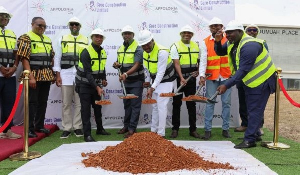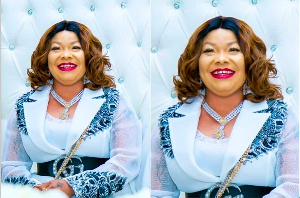A Comparative Study of Requirements of Good Legal System and the Court System Asante Fordjour
MEMO: A GOOD LEGAL SYSTEM (PART ONE)
The Republic of Ghana has one legal system- Parliament makes the laws, the executive government administers the laws, and the judiciary independently interprets and applies them. The common law system, as developed in the United Kingdom, forms the basis of Ghanaian jurisprudence. This means that Ghana has legally speaking, a good legal system. According to justicediary.com, a good legal system is one that provides fair justice without any partiality. “It should be transparent and proceedings must be made public to make the judgment unbiased.” Research shows however, that corruption is the biggest enemy of the good judiciary system and that governments should ensure that it is kept at bay. “A good legal system is one that has little or no influence over the judiciary. A good legal system must speed up the proceedings instead of postponing the hearing dates because it is said that justice delayed, is justice denied.” What then can be said of the Ghanaian legal system? INTRODUCTION A few days ago, I overhead or should I say; read from the Ghanaian media that a group of foreign or local-based Ghanaians, attempt to seek preliminary judicial redress over hate speech, at the International Criminal Court (ICC), at The Hague, The Netherlands. The question that came to mind was: “What is Wrong with the Ghanaian Legal System?”I will attempt to answer this question here. The Ghanaian legal system is based on a fundamental belief in the rule of law: freedom and justice; probity and accountability; and the independence of the judiciary. All people- Ghanaians and non-Ghanaians alike- ought to be seen treated equally before the law and safeguards, indeed exist in the constitution to ensure that people are not treated arbitrarily or unfairly by governments or officials? Yes. Principles such as procedural fairness; judicial precedent and the separation of powers, are fundamental to Ghana’s legal system. The main feature of the republic’s common law system bid is that judges’ decisions in pending cases are motivated by the decisions of previously settled cases. One might however, rightly asked: what then, if there were to be no such cases with similar facts?
Requirements of Good Legal System
A legal system consists of judges, lawyers and clients. And it is said that it is the responsibility of every one to act ethically and morally so that legal system works well. It is also very important that “a client must state the truth to the lawyer and lawyer must be equally honest with the client.” Thus, a good legal system requires the lawyer to be very honest with the job so that right justice is delivered. “Judges should be free from any influence so that they can write the judgment without any bias.” In common law country such as ours, writing a judicial opinion or judgement which could be relied on in future decisions could be arguably, the basis for honest delivery and administration justice, fairness and equality. The state is governed and ruled by laws established by the legislature.
Indeed laws are created by human beings who are members of the legislative or judicial body and therefore, are not free from flaws, errors and future scrutiny. So it is suggested that laws are created or formulated according to the needs and changing demands of the society it serves. Thus with time laws might be unnecessary, incomplete, or even inappropriate. It is from this premise that judicial system or the judicature is created to evaluate, analyze and interpret laws that are brought before it.
THE COURT SYSTEM
In the United Kingdom the structure of the courts in all the three jurisdictions [England and Wales, Scotland and, Northern Ireland], according to UK Law Online, tends to be arranged according to the subject-matter of cases brought before the courts rather than the source of the laws to be applied. Laws are the ones that dictate how a nation/country functions and are political, economical and societal focused. Law serves as the mediator between all peoples living in the state. Without rules, there would never be concordance among all the citizens. The law is thus the basis for decision-making as it regulates the events, movement of manpower, monetary, and natural resources which will be used for the development of the country and welfare of all men. Law indeed sets out “details of the rights and responsibilities and regulates the conduct of every citizen living in the country.”
A lawless country therefore, might find it difficult to develop in peace as most affluent and the strong individuals within the state are more likely to offend with impunity. In the UK the more serious criminal cases are tried on the basis of a document called the indictment. Here the defendant is indicted on criminal charges specified in the indictment by the prosecutor. In most cases, the prosecution is on behalf of the Crown (the State) and is handled by an official agency called the Crown Prosecution Service, which takes the case over from the police who have already investigated most of the evidence. The first stage will be to decide whether prima facie, there is a case to answer. This process- called committal will be dealt with by a magistrate on the basis of evidence disclosed in papers provided by the prosecutor. If the case proceeds, it is heard in the Crown Court (there is only one Crown Court but it has about 70 centres around the jurisdiction). Here, the trial is before a judge and jury. The judge presides over the trial process by attempting to ensure clarity and fairness. The judge must also consider and decide on legal issues (such as whether a piece of evidence is admissible - should be put before the jury) and also instruct the jury as to the correct view of the law relevant to the case. This is termed as “jury direction”. The jury decides the facts - whose story is more believable - and applies the law to those facts. So, it is the jury not the judge which reaches a verdict on the guilt or innocence of the defendant. In criminal cases, the prosecution has the burden of proof - it must prove guilt, rather than the defendant having to prove innocence. The standard (= level) of proof is heavy - guilt must be proven beyond reasonable doubt.
In less serious criminal cases which according to Home Office Research & Statistics Directorate web site for statistics (the 1996 British Crime Survey), comprise over 90% of criminal cases - the case is sent for summary trial in one of over 400 magistrates’ courts [this 400 figure might be lower due to the current economic climate]. A summary trial means there is no committal and no jury. The trial is before a bench of magistrates. In most cases, there are three magistrates who are "lay" persons - in other words, they are not professional judges nor are they lawyers, but, like the jury, they are persons from the local community. Save travel and subsistence expenses, magistrates, also known as Justices of the Peace or JPs, are unpaid volunteers and come from all walks of life and backgrounds, and can be any age from 18 to 70. They retire at 70, and are in the words of Directgov, usually expected to serve for at least five years. One won’t normally be appointed JP if s/he is, over 65.
The selection and the roles of UK Magistrates are not within the scope of this work. There are an increasing number of "stipendiary" magistrates - paid magistrates who are qualified lawyers. We mention in passing that Magistrates sit in courts in their local area and hear criminal cases and help solve disputes- civil and family litigations. With experience and extra training, magistrates, according Directgov, can go on to deal with cases such as child custody; and taking children into care in family courts. Thus “Magistrates don’t just deal with crimes but also hear some civil cases, over things such as: unpaid council tax and appeals against licensing decisions. Those defendants who are dissatisfied by the verdict may be able to appeal: from the Magistrates’ Courts. There is an appeal to the Crown Court on matters of fact or law. From the Crown Court, it might be possible to appeal to the Criminal Division of the Court of Appeal on matters of fact or law. Certain legal disputes arising in the magistrates’ courts or the Crown Court can be taken before the Divisional Court of the High Court.
It is suggested that in the majority of cases sent by the magistrates to the Crown Court that result in a sentence receive a punishment within the existing powers of magistrates. The argument had been that by sending Defendants to the Crown Court the magistrates presumably thought they deserved a higher sentence. The main features of the British Magistracy are the identification of the legal facts from fictions, not forgetting its community-focus and “common sense” approach to access to justice. At present, there is a general limit on the sentencing powers of magistrates' courts, which according to PART 12, clauses 137-138: MAGISTRATES' SENTENCING POWERS, prevents JPs from imposing more than six months' imprisonment for any one offence [see also, Magistrates' Court Act 1980, s 31(1)]. The limit for consecutive terms of imprisonment is also six months, unless the sentence relates to two or more either way offences(e.g. theft, burglary), in which case the limit is 12 months.
The Courts of Ghana interpret and apply the laws of Ghana, decide cases/disputes among and between individuals within the state and as well as those of special republican interest. Like in the UK, legally argued, all cases are likely to begin at the Magistrates’ Court and end at the Supreme Court. The Supreme Court of Ghana is the highest court of appeal on all matters that have some element of constitutional interpretations, whether decided at the Magistrates or High Court. In the UK matters of important legal dispute arising in the Crown Court or Divisional Court may be appealed to the House of Lords [see Information on the Judicial Work of the House of Lords].
In civil cases, the litigation is commenced by a plaintiff (a private person or company or a public authority) against a defendant. The plaintiff must try to prove the liability of the defendant on the balance of probabilities. The sorts of claims arising in the civil courts are typically about contracts (most common of all), torts (civil wrongs such as the causing a road accident through negligence, damaging a person’s reputation through defamation, or affecting the enjoyment of their property through causing a nuisance such as by pollution) and land disputes. The choice of court depends in most cases on the value of the claim. Claims of lesser value [small claims- not more than £5,000.00] will start in a County Court. The UK Magistrates, for example, have jurisdiction over £5,000.00 fine.
In Australia “the Federal Court’s jurisdiction is broad, covering almost all civil matters arising under Australian federal law and some summary criminal matters. The court also has substantial and diverse appellate jurisdiction, including over the decisions of single judges of the Federal Court and the Federal Magistrates Court (in non-family-law matters) and some decisions of the state and territory courts. The Family Court is Australia’s superior court in family law. Through its specialist judges and staff, the court helps to resolve complex family disputes. It also covers specialised areas such as cases relating to The Hague Convention on International Child Abductions (which came into force in Australia in December 1998) and the international relocation of children by parents or guardians. The Federal Magistrates Court was established by the federal parliament in 1999 and conducted its first sittings in July 2000. Its jurisdiction includes family law, bankruptcy, unlawful discrimination, consumer protection and trade practices, privacy, migration, copyright and industrial law” ( See reports on the Australia Legal System, www.dfat.gov.au/facts/legal_system.html).
According to the report, each state and territory court system operates independently. All states have supreme courts and some also have courts of criminal appeal, which are the highest appellate courts at the state level. Courts known as ‘district’ or ‘county’ courts hear the more serious cases, with a judge presiding over the court to interpret and determine the law. “For more serious charges it is usual for a jury (usually of 12 people) to determine the guilt or innocence of defendants. Serious offences such as murder, rape and armed robbery are usually tried in a higher court. Lesser offences are dealt with in lower courts, known as local or magistrates courts (or courts of petty sessions), where magistrates determine the guilt or innocence of defendants. In all cases, defendants are considered to be innocent until proven guilty beyond all reasonable doubt.” Australia has no death penalty. The Ghana’s Independence Constitution of 1957[see Ghana (Constitution) Order in Council, 22 February 1957] established a unitary system of government, with powers vested in the State.
The unitary laws apply to the whole of the Republic of Ghana and defined exclusive powers- imbuing the National Assembly [Legislature] and Government with the exclusive power to make laws on matters such as trade and commerce, taxation, defence, external affairs, and immigration and citizenship. Unlike the 1960 Republican Constitution which expressly established two superior courts- the Supreme Court and the High Court, the 1969 Constitution established three superior courts: the Supreme Court of Ghana, the Court of Appeal, and the High Court of Justice. In addition, Parliament had by law, power to establish ‘other inferior and traditional courts’. This provided accommodation for such inferior courts as Circuit Courts as well as for Local Courts. Thus there had been the desire in Ghana that the judicial power of the State must be vested not only in the superior courts but also in ‘such inferior courts as may be provided for by law’. In consequence there were also Circuit Courts, District Courts, Juvenile Courts and Local Courts operating as law enforcement institutions during the First Republic. So you may ask, why these legal uncertainties and animosities?
CONCLUSION
In our next article JusticeGhana shall look at barriers to a fair legal system. Judicial system of a country must ensure that its citizens are able to live safely and in a civilized manner and must have the ability to keep the crime rate in check through appropriate sanctions. It helps the citizens to live free and without fear as they know that if they have any legal issues then their pleas will be listened in the court without any partiality and the judgment will be a just one. Legal rules must however, not be confused with moral expediency as good morals, might have different meanings among diverse beliefs in a population. For example, whereas abortion is regarded as immoral, there are those who might view it as woman’s right? Indeed, consistent State practices may influence judicial decisions and opinions, a timely parliamentary intervention could safeguard an eroding State values or morals.
Asante Fordjour is the Director of Legal & Media Research, JusticeGhana Group, UK.
JusticeGhana.com
Opinions of Monday, 28 May 2012
Columnist: JusticeGhana












